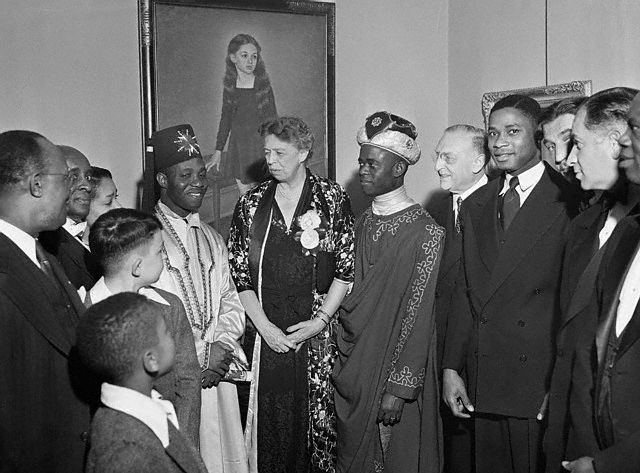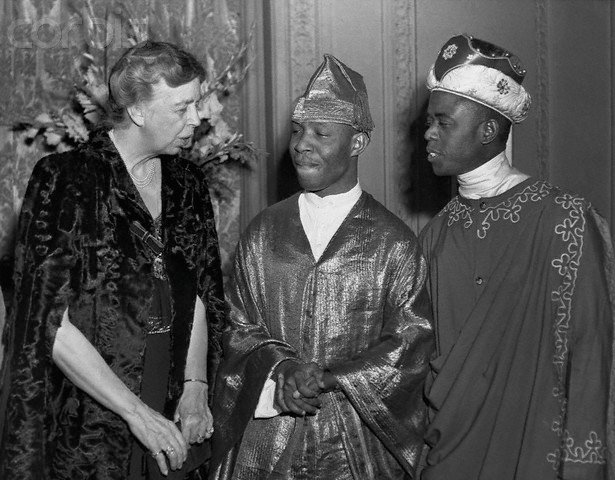Outspoken and fearless, Mazi Mbonu Ojike was a great Nigerian nationalist, great Pan-Africanist and African cultural crusader.
He was also an author and an activist for social justice and racial equality.
Credited for coining the legendary phrase “Boycott the Boycottables” Ojike died at the age of 44 and many believed he transitioned to the land of his ancestors without realizing his full potentials.
The coinage “Boycott the Boycottables” would earn him the title the “Boycott King.”
Despite dying early in an auto crash, Ojike’s psychological and intellectual impact was indescribable as he gave back to the Nigerian and the African pride in him.
An orator and wordsmith, Ojike was said to be a man of intellect and understanding.

“He canvassed passive resistance, which was made popular by the great Indian leader, Mahatma Gandhi. He traversed the length and breadth of the colonized territory, urging the people to “boycott the boycottables,” Emmanuel Oladesu wrote of Ojike.
“He practiced,” continued Oladesu “what he preached by adopting native names, clothes, food, and ways of life. Ironically, he toured the towns and villages with his message of cultural nationalism in cars imported from abroad. He wore traditional dress to office and served palm wine, instead of whiskey, champagne or beer at his official receptions and parties. He replaced his suit with agbada or jumper and encouraged civil servants to appear in office in native attire.”
An Igbo, Ojike’s political stature was to come third after fellow ndi-Igbos Dr. Nnamdi “Zik” Azikiwe and Dr. Kingsley Ozuomba Mbadiwe.
A renowned student organizer and leader, a newspaper columnist (journalist) and a fire-brand politician, Ojike was held high in the class of giant Nigerian political heavyweights like Chief H.O. Davies, Dr. Michael Okpara, Chief Ladoke Akintola, Chief Bode Thomas, Chief Remi Fani-Kayode, among others.
As succinctly captured in a 2013 book entitled “The Igbo Intellectual Tradition: Creative Conflict in African and African Diasporic Thought,” edited by Gloria Chuku, the author wrote: “Ojike’s uncompromising rejection of alien culture, particularly European civilization and colonial domination, and his anti-European imperialist movement earned him the title of “The King of Boycottables.” Yet Ojike was a beneficiary of European civilization and even campaigned for the retention of some aspects of that civilization in Africa. This type of contradictions, as well as controversies and “scandals” surrounding Ojike’s scholarship, political career and activism are also examined.”

During Nigeria’s struggle for independence, Ojike became famous through his weekly column, ‘Weekend Catechism’ in the West African Pilot.
Ojike was born into the polygynous family of Ojike and Mgbeke Emeanulu around 1912 in Ndiakeme village of Arondizuogu in eastern Nigeria.
According to historical accounts, Ojike’s childhood saw conditions of great devastation, insecurity, uncertainty, and anxiety occasioned by the confluence of events, that included British subjugation of the Igbo, the outbreak of WWI and the influenza epidemic of 1918–1919.
These occurrences helped to shape his life.
As one of the 19 sons of his parent, Ojike was said to demonstrate early in his life an independent mind and force of character.
“He taught us and kept teaching us, the beauty, dignity, and functionality of our traditions”, Prof. Ukwu I. Ukwu, said of Ojike. “His greatest impact was psychological and intellectual. He gave birth to every Nigerians pride in his culture as a living functional whole”, he added.
In 1936, Ojike as a teacher proved what Prof. Ukwu said of him by leading an agitation for more pay for junior teachers at Dennis Memorial Grammar School, Awka, accusing the authorities of discrimination, stressing that the salaries of junior teachers ought to have been increased when salaries of their senior colleagues were.
Resigning as a teacher in 1938, Ojike established contact with Dr. Azikiwe, who encouraged him to go for further studies. He later attended Lincoln University.
His colleagues were Dr. Kwame Nkrumah, who later became President of Ghana and other pioneer members of the African Students Association of America and Canada and the group became a veritable platform for nationalist activities.
Whilst in the United States, Ojike’s activism was not confined to associations, conferences, and rallies. He published three books in his three years there: Portrait of a Boy in Africa (1945), My Africa (1946) and I have Two Countries (1947).
Ojike masterfully and succinctly portrayed for his foreign audience the identity and integrity of African culture in his first two books and his penetrating analysis as one writer put it was further pointed in his third book when in recording his American experience Ojike probed beneath the glitter of the American dream to draw illuminating comparisons with life in Africa.
The message in his third book was said to be for both his country and to all humanity: “I am not proud of what our world has been nor of what it is; I am proud to join men and women of goodwill to make our civilization what it ought to be.”
Upon his return to Nigeria in 1947, Ojike, as expected, entered into politics, turning to Zik for political mentoring. Ojike became an automatic member of the National Council of Nigerian Citizens (NCNC) and a thorn in the flesh of the British interlopers.
“As a critic of the colonial administration, he was marked down for liquidation. When he poured venom on the British government over the behavior of security forces during the Iva Valley massacre in 1949, he was charged with sedition and fined 40 pounds,” Oladesu wrote in 2013.
Ojike was an apostle of self-reliance.










